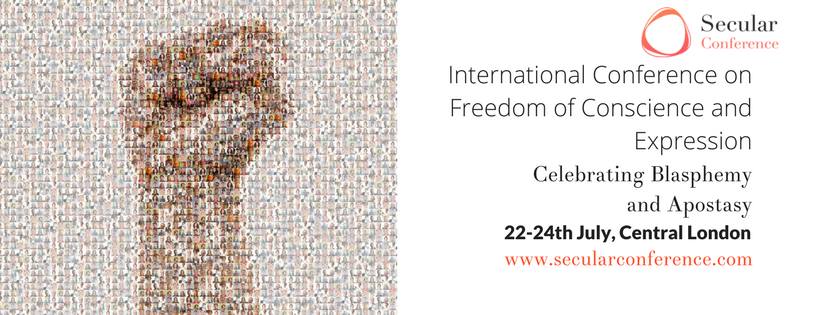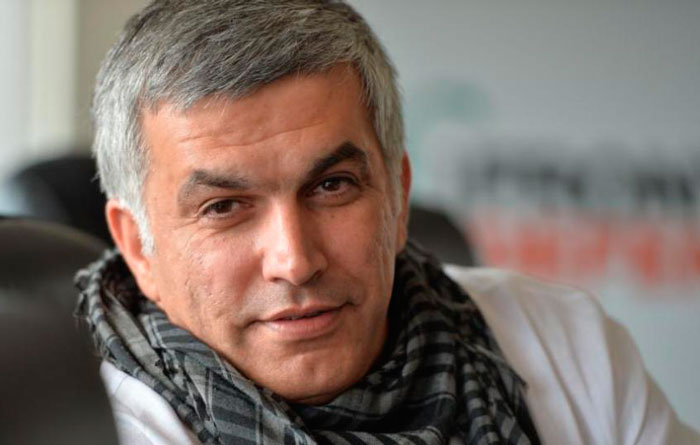12 May 2017 | Events
[vc_row][vc_column][vc_column_text]
Join notable free-thinkers from around the world for a weekend of discussions and debates on freedom of conscience and expression in the 21st century at a spectacular venue in central London during 22-23 July 2017.
On 24 July, an activist strategy meeting will be followed by body-painting in support of ex-Muslims, which will be open to the public.
The two-day conference will discuss censorship and blasphemy laws, freedom of and from religion, apostasy, the limits of religion’s role in society, LGBT and women’s rights, atheism, secular values and more.
Speakers from countries or the Diaspora as diverse as Afghanistan, Algeria, Bangladesh, Canada, Egypt, France, India, Iran, Iraq, Iraqi Kurdistan, Ireland, Lebanon, Malaysia, Morocco, Nigeria, Norway, Pakistan, Palestinian Territories, Poland, Saudi Arabia, Sudan, Sweden, Switzerland, Syria, Turkey, Tunisia, UK, Ukraine, US and Yemen will gather in London to defend freedom of conscience and expression and argue that freedoms are not western but universal.
The conference will highlight the voices of people on the frontlines of resistance – many of them persecuted and exiled – as well as address challenges faced by activists and freethinkers, elaborate on the links between democratic politics and free expression and conscience, promote secular and rights-based alternatives, and establish priorities for collective action.
Art and culture will be integral to the event as will lively debate with the dauntless use of the free word.
Full schedule: http://www.secularconference.com/agenda-2017/
Confirmed Distinguished Speakers:
A C Grayling, Philosopher
Aliaa Magda Elmahdy, Egyptian Feminist Activist
Alya Al-Sultani, British-Iraqi Vocalist and Composer
Ani Zonneveld, Founder and President of Muslims for Progressive Values
Annie Laurie Gaylor and Dan Barker, Co-Presidents of the Freedom From Religion Foundation
Armin Navabi, Founder of Atheist Republic
Asher Fainman, President of Goldsmiths Atheist Society
Benjamin David, Editor-in-Chief of Conatus News
Bonya Ahmed, Activist, Writer and Blogger at Mukto-Mona
Cemal Knudsen Yucel, Co-Founder and Chair of Ex-Muslims of Norway
Chris Moos, Secular Activist
Damon Conlan and Neil Edwards, Magicians
Dave Silverman, President of American Atheists
Deeyah Khan, Filmmaker
Djemila Benhabib, Author and Activist
Elham Manea, Yemeni-born Author and Human Rights Campaigner
Fariborz Pooya, Bread and Roses TV Presenter and Editor
Fauzia Ilyas, Founder of Atheist & Agnostic Alliance Pakistan
Gina Khan, One Law for All Spokesperson
Gita Sahgal, Director of Centre for Secular Space
Gona Saed, Co-Founder of Kurdistan Secular Centre
Gurpreet Kaur Bhatti, Award-winning Playwright
Halima Begum, Ex-Muslim Feminist Researcher and Blogger
Hassan Radwan, Agnostic Muslim Khutbahs blog
Houzan Mahmoud, Culture Project Co-Founder
Imad Iddine Habib, Founder of Council of Ex-Muslims of Morocco
Inna Shevchenko, FEMEN Leader
Iram Ramzan, Journalist and Founder of Sedaa
Ismail Mohamed, Egyptian Atheist and Founder of Black Ducks Talk Show
Jane Donnelly and Michael Nugent, Atheist Ireland’s Human Rights Officer and Chairperson
Jodie Ginsberg, CEO of Index on Censorship
Karima Bennoune, UN Special Rapporteur in the Field of Cultural Rights
Karrar D. Al Asfoor, Co-founder of Atheist Alliance Middle East and North Africa
Kate Smurthwaite, Comedian
Kenan Malik, Author and Broadcaster
London Humanist Choir
Maajid Nawaz, Founding Chairman of Quilliam Foundation
Marieme Helie Lucas, Algerian Sociologist and Founder of Secularism is a Women’s Issue
Mario Ramadan, Co-Founder of Freethought Lebanon
Maryam Namazie, Iranian-born Rights Activist, Writer and Conference Organiser
Nadia El Fani, Tunisian Filmmaker
Nasreen Rehman, Co-Founder and Chair of British Muslims for Secular Democracy
Nina Sankari, Polish Atheist Activist
Noura Embabi, Muslim-ish President
Peter Tatchell, Human Rights Campaigner
Pragna Patel, Director of Southall Black Sisters
Rana Ahmad, Head of the RDF Arab Atheist Community
Rayhana Sultan, ExMuslimBecause
Richard Dawkins, Author and Scientist (subject to availability)
Sadia Hameed, Spokesperson of the Council of Ex-Muslims of Britain
Sanal Edamaruku, Founder and President of Rationalist International
Sarah Haider, Co-Founder of Ex-Muslims of North America
Sarah Peace, Nigerian Artist and Director of Fireproof Library
Savin Bapir Tardy, Counselling Psychologist for The Iranian and Kurdish Women’s Rights Organisation
Shabana Rehman, Performance Artist and Human and Animal Rights Advocate
Shelley Segal, Singer/Songwriter
Tasneem Khalil, Swedish-Bangladeshi Journalist and Editor of Independent World Report
Teresa Gimenez Barbat, MEP, Group of the Alliance of Liberals and Democrats for Europe and Euromind
Victoria Gugenheim, Award-winning Body Artist
Waleed Al Husseini, Palestinian Writer and Founder of Council of Ex-Muslims of France
Yasmine Mohammed, Confessions of an ExMuslim
Yasmin Rehman, Women’s Rights Campaigner
Zehra Pala, President of Atheism Association of Turkey
Zineb El Rhazoui, Moroccan-born Columnist for Charlie Hebdo
Speaker biographies available here: http://www.secularconference.com/speakers-2017/
For more information, contact Maryam Namazie, [email protected].uk.
The conference is sponsored by: Alliance of Liberals and Democrats for Europe; Atheist International Alliance; Bread and Roses TV; Center for Inquiry; Centre for Secular Space; Council of Ex-Muslims of Britain; Culture Project; Euromind; Equal Rights Now; Fitnah; Freedom from Religion Foundation; National Secular Society; One Law for All; Richard Dawkins Foundation for Reason and Science; Southall Black Sisters; and Secularism is a Women’s Issue.[/vc_column_text][/vc_column][/vc_row][vc_row][vc_column][vc_column_text]
When: 22-24 July
Where: Central London
Tickets: From £65 via Secular Conference No tickets will be sold at the door.
[/vc_column_text][/vc_column][/vc_row]
18 Apr 2017 | Awards, Awards Update, Digital Freedom, News and features, Youth Board
[vc_row][vc_column][vc_column_text]
Fergal Keane is a journalist who made his name as a war reporter at the end of millennium, covering conflicts from Congo and Rwanda to Kosovo. In 2003, the Index on Censorship recognised his efforts with their award for Outstanding Commitment to Journalism Integrity. It wasn’t Keane’s first award, and it wasn’t his last either. On top of his Orwell Prize (1996) and Amnesty International Press Award (1993) and Television Prize (1994), his OBE and his BAFTA (both from 1997), Keane has since added a Sony Gold award in 2009, for his inspiring Radio 4 series ‘Taking a Stand’, and the Ireland Funds Literary Award in 2015.
In 2004, following decades in the profession, Keane made the decision to stop entering active war zones. “I couldn’t justify potentially robbing my children of a father,” he told the Daily Telegraph in 2010. “I couldn’t do it anymore.” But despite a slight career shift, Keene continues his commitment to journalism and justice just as fervently. He is now a special correspondent for the BBC, still writing and broadcasting on topics like the refugee crisis, the Yemen conflict and the South Sudan civil war – though sometimes from afar – as well as often being dispatched to the latest scenes of terrorism in Europe, whether France, Belgium or Germany. Wherever he is, he retains an insight and awareness of historical context that few can match.
Beyond the BBC, he is also the author of several well-received books and in 2011 he received an honorary degree from the University of Liverpool, where he is now three years into a Professorial Fellowship. He is part of the university’s Institute of Irish Studies, teaching students on the Understanding Conflict masters programme.
Speaking to the university’s website in 2015, Fergal criticised the “endlessly reductive” mainstream press and urged his students to “always challenge your opinions with facts, every day of your life. You will only know what your opinions are worth if they are taken out of the box and subjected to the most severe tests. Facts, facts, facts.”
Not all Keane’s work is confined to journalism, however. In 2005, he founded Msaada, an NGO dedicated to assisting Rwandans – and Rwandan society – to recover from the 1994 genocide, through meaningful, income-generating projects. It continues to support such projects today.
Samuel Earle is a member of Index on Censorship’s Youth Advisory Board. He is a freelance writer and recent masters graduate from the London School of Economics and Political Science, where he studied Political Theory. He lives in Paris.[/vc_column_text][/vc_column][/vc_row][vc_row][vc_column width=”1/2″][vc_single_image image=”85476″ img_size=”full” alignment=”center” onclick=”custom_link” link=”https://www.indexoncensorship.org/2016/11/awards-2017/”][/vc_column][vc_column width=”1/2″][vc_column_text]
Index on Censorship Freedom of Expression Awards
Seventeen years of celebrating the courage and creativity of some of the world’s greatest journalists, artists, campaigners and digital activists
2001 | 2002 | 2003 | 2004 | 2005 | 2006 | 2007 | 2008 | 2009 | 2010 | 2011 | 2012 | 2013 | 2014 | 2015 | 2016 | 2017[/vc_column_text][/vc_column][/vc_row][vc_row][vc_column][vc_basic_grid post_type=”post” max_items=”12″ style=”load-more” items_per_page=”4″ element_width=”6″ grid_id=”vc_gid:1492505799978-a5ad6490-9f12-5″ taxonomies=”4881, 8935″][/vc_column][/vc_row]
3 Apr 2017 | News and features, Turkey, Turkey Uncensored
[vc_row][vc_column][vc_column_text]

Enough is Enough, a play formed as a gig, tells the stories of real people about sexual violence, through song and dark humour. It is written by Meltem Arikan, directed by Memet Ali Alabora, with music by Maddie Jones, and includes four female cast members who act as members of a band.
While touring Wales recently with my new play Enough Is Enough, I thought about what I experienced with my earlier work in Turkey. But which Turkey?
In the so-called “New Turkey”, everything is being surveilled by the government, from plays and books to everything you share on social media. There were no undercover Welsh police or prosecutors sitting in the audience in Newport or Pontypridd.
We designed Enough is Enough as a touring project. We went to 21 different Welsh venues in 21 different places, north, south, east and west, in less than a month. Audience members had strong positive reactions and some suggested that the production should be taken into schools. In the New Turkey even thinking about taking the play to schools would be enough to be accused of something unimaginable. If you dared sing the songs sung in Enough is Enough, you can be sure you would receive a violent reaction.
When you confront reality in a direct way, even if it is through art, governments around the world do not want to hear your voice. The New Turkey’s government is only an extreme example. When you speak truths, governments do not want you to be heard – they do not want you at all.
Yet when you show reality in a direct way, when you slap the audience with pain, the reaction becomes the same everywhere. First they are shocked, then they find you unusual, but in the end they compliment you for doing it.
During our tour of Wales, people let us into their hearts, looked after us and many venues promised to invite us again. Audience members shared their stories with us. Many wanted to work with us, others supported us unconditionally.
After every performance we had “shout it all out” sessions. We heard repeatedly how many of the issues we confront on stage – sexual violence, oppression and misogyny – are being swept under the carpet because people don’t like to discuss them.
These sessions took me back to a time before I wrote Mi Minor, the play accused of being a rehearsal for the Gezi Park protests in 2013. A time before I had to leave the country because of those accusations. A time before the innovations in the New Turkey was not as horrifyingly obvious as they are now. A time when the AKP, the ruling party of Turkey, was backed not just by the liberals in Turkey but liberals around the world. Back then I was told I was wrong about the government. It was in 2007 that I wrote a play entitled I am Breaking the Game.
That play premiered in Zurich and toured to Amsterdam, Rotterdam, Istanbul and Ankara. No matter where it was performed there was a particular reaction that stuck with me: “These issues are not our issues, they belong to the East.”
I was inspired by the stories of people I know personally. I was in touch with the victims of domestic violence, honour killings, rape, incest and sexual abuse. I knew all stories were true. So I wasn’t sure why then so many didn’t see these issues as theirs. I searched and searched for this place far away from everyone and everything, where all these horrible things keep happening, called the “East”. Eventually I found myself in the West.
After graduating from the London Academy of Music and Dramatic Art, actor Pinar Ogun felt inspired by Breaking the Game. She felt angry that the run of the play was short in Turkey and she became passionate — almost obsessed — to stage it in London. She tried to convince her instructors at LAMDA, artistic directors of various venues and theatre friends to make it happen. She even introduced me to a couple of people who showed interest, but the reaction was again the same: “Of course these issues are very important but these issues are not our issues, they belong to the East. We resolved these issues in the 1970s. Such plays, performances have been done in the past. These are very old discourses.”
Laurie Penny was one of the only people who had a different reaction. She interviewed me nine years ago: “However much she is hounded by Turkish authorities and tutted at by European theatre goers, one thing is certain: Meltem Arikan is not about to roll over and hush. And thank goodness for that.”
When slapped in the face does it hurt less in the West than in the East?
Why is it considered a social phenomenon when women are killed in the name of honour in the East but an individual crime when women are killed in the name of passion, obsession or jealousy in the West? Child marriage in the East is seen as a nightmare. But, in the West, does calling pregnant children “teen moms” prevent their lives from turning into a nightmare?
After I was forced to leave Turkey and began living in Wales, Ogun restarted her campaign to stage I am Breaking the Game. A year ago, I finally said yes. I’ve been observing a West that has been dazzled by the light of past enlightenments, alienated from its very own issues, attached to the chains of concepts and utterly disconnected to its reality. With Ogun’s company, Be Aware Productions, we applied to Arts Council Wales for research and development funding. But even after the grant was awarded, I was afraid I would still hear the echoes of the long-dead rejection: “These issues are not our issues, they belong to the East”, “the stories of the East”, “The East…”
My rejections, my questions, my issues.
During our research process we met with Welsh sex workers, organisations that help and support women facing violence, and victims. My initial idea was to replace these new stories with the stories in the play, but then I decided to write a new play entirely.
I developed the play with stories of abuse, rape and incest from Britain, all true stories, all had actually happened in these lands. Sometimes I used the exact words of the victims, sometimes I made them more poetic, but most importantly, in order to reach the hearts of the audience, I decided to use the magic of music and that’s how the idea of making it a gig-theatre came to be.
My rejections, my questions, my issues.
When writing Enough is Enough, my intention was to become a megaphone to the people who are facing violence here, to point to the elephant in the room by talking about incest and to underline the fact that when it is about the existence of women and men, those in the West and those in the East were the same.
I dare to say this because I can see blatantly that no matter how much cultures, cuisines, languages, clothes, ethnical backgrounds have managed to differentiate each and every one of us, no matter whether we were born in the West or in the East, we’re all forced to have the life forms designed by the patriarchy and so we are all dominated by the same fears for thousands of years.
Just like the East, the West also lives in its own virtual world built on the concepts of the patriarchal culture. And the relative comfort of this world doesn’t mean a thing for the victims. Just like Turkey, just like France, just like Yemen, just like the USA, women, children and men in Britain become victims. Abuse, rape and incest endlessly continue to exist with all its savagery within society, behind closed doors. The pain and consequences of this ongoing violence continue to be ignored. And while children become the children of fear, not the children of their parents, all around the world violence continues to beget violence. Those who face their pain empathise with victims, whereas those who escape their pain empathise with the perpetrators.
During the Wales tour, the reaction from people who were violated, who knew what violence was, who did not escape from their pain, who faced themselves, who were not in denial of their experiences, in short, the reaction from people who knew the pain of reality, was warm, open and stripped-down. We received the biggest support from women’s organisations, women, some brave men, young people and the LGBT community.
On 8 April 2017 at the Wales Millennium Centre and from the 26-29 April at Chapter Arts Centre, we will continue to say “Enough is Enough”. This time our goal is to reach promoters and artistic directors for an England tour. We want to make our voice be heard in England, and shout “Enough is Enough” together with the English audience.
I really wonder about the reaction of the audience in England. Will they be as open as the Welsh audience or will they keep repeating their apologies while saying these are the East’s problems. The irony is that this time we will be coming from the West, at least west of England.
Yet, whatever the reaction of the audience in England may be, I know for sure there won’t be any audience members who try to organise a mob against us.
Whatever the reaction of the audience in England may be, I know for sure the play would never be banned with the accusation of “disturbing the family order”.
Whatever the reaction of the audience in England may be, I know for sure that newspapers won’t run a smear campaign against the actors because of our play.
Whatever the reaction of the audience in England may be, I know for sure I won’t receive any death threats just because I dared to address violence against women. [/vc_column_text][vc_column_text]

Turkey Uncensored is an Index on Censorship project to publish a series of articles from censored Turkish writers, artists and translators.
[/vc_column_text][vc_basic_grid post_type=”post” max_items=”4″ element_width=”6″ grid_id=”vc_gid:1491211961521-80d1b694-85da-6″ taxonomies=”8607″][/vc_column][/vc_row]
13 Mar 2017 | Bahrain, Bahrain News, Middle East and North Africa, News and features
[vc_row][vc_column][vc_column_text]
The trial of jailed Bahraini human rights activist Nabeel Rajab on charges of spreading “rumours and false news” was deferred for a second time on 7 March until 16 April. The charges relate to televised interviews in 2014 and 2015 in which he criticised authorities. In the meantime, he remains in detention after being denied bail.
This is one of two separate trials Rajab faces. The other is over tweets and retweets about the war in Yemen, which his accusers say “spread rumours in wartime”, insulted a neighbouring country (Saudi Arabia) and offended a statutory body within Bahrain. This trial has been postponed 11 times.
If convicted on all charges, Rajab faces up to 18 years in prison.
Sayed Ahmed Alwadaei, director of advocacy at Bahrain Institute of Rights and Democracy, said: “Bahrain is persecuting Nabeel Rajab for his speech. They would rather jail the messenger on human rights and double-down on repression than listen to what he has to say. The international community must take a stance.”
In February 2017 the European Parliament passed a resolution urging the EU and its member states “to intervene with the Bahraini Government in order to appeal for the release of Nabeel Rajab and of all those held solely on the basis of their peaceful exercise of freedom of expression and assembly”.
Rajab is the winner of a 2012 Index on Censorship Freedom of Expression Award for his efforts against human rights violations by the Bahraini government in 2011. He judged the Index on Censorship Freedom of Expression Awards last year and is also the president of the Bahrain Centre for Human Rights.
Previously, Rajab had been arrested and sentenced to five years in prison in 2012 for criticising Bahraini authorities and for leading pro-democracy demonstrations. He has faced serious health problems due to his numerous detentions, which often were marked by solitary confinement and unclean conditions.
Bahrain regularly breaches basic human rights, and the persecution of Rajab is merely one example of the unjust treatment of those who attempt to exercise their freedom of expression within the country. Authorities have been taking increasingly harsh measures to prevent and punish dissent in the country.[/vc_column_text][/vc_column][/vc_row][vc_row][vc_column][vc_basic_grid post_type=”post” max_items=”4″ element_width=”6″ grid_id=”vc_gid:1489420587513-b30cc26d-4ec8-5″ taxonomies=”716″][/vc_column][/vc_row]





